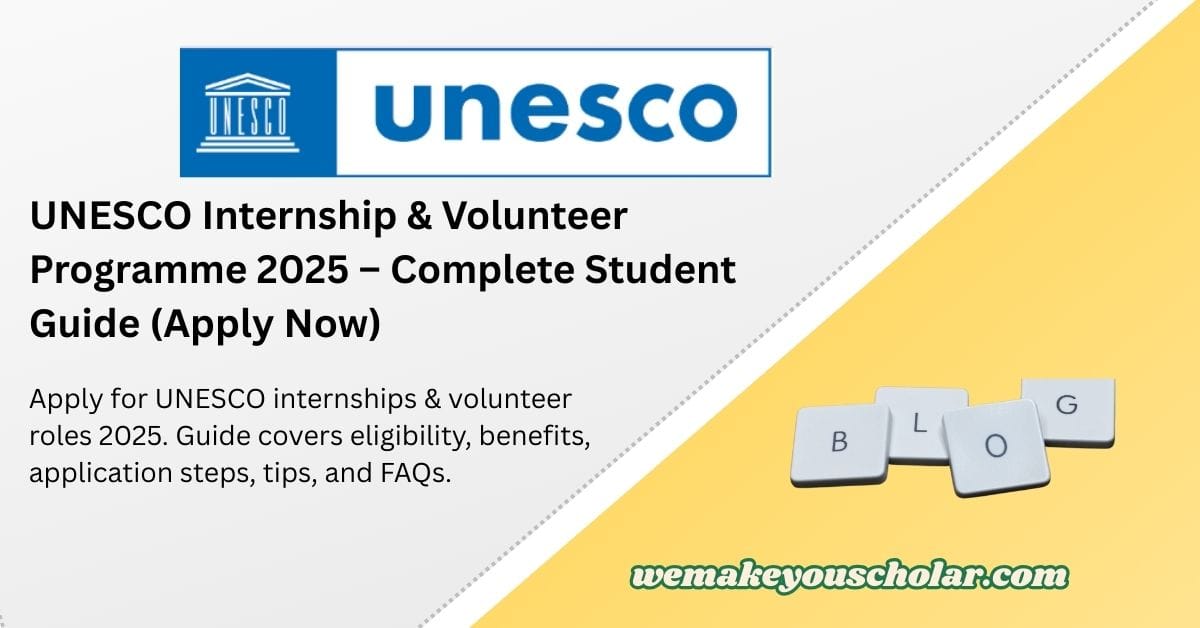UNESCO Internship & Volunteer Programme 2025 — The Fast, Friendly Guide Students Need
If you’re a student or recent graduate looking for meaningful international work experience, the UNESCO Internship Programme and the UNESCO Volunteer Programme are two of the best entry points into a global organisation that works on education, science, culture, and communication worldwide.
This guide gives you a complete, student-friendly walkthrough: what each programme offers, who is eligible, how to apply (step-by-step), what to expect during the placement, tips to stand out, and answers to the most common questions. Read this once; save time and avoid the usual mistakes applicants make.
Quick Snapshot: What Are These Programmes?
- UNESCO Internship Programme — Short-term, practical assignments for students and recent graduates. Placements provide hands-on experience inside UNESCO offices or remotely, helping you learn how a UN agency operates.
- UNESCO Volunteer Programme — Volunteer opportunities (including online volunteering) where you can contribute to UNESCO programmes, often requiring specific skills and offering the chance to support projects in the field or remotely.
Both programmes are excellent for CV-building, networking, and developing sector-specific skills. Note: UNESCO internships are generally unpaid, but they provide training and exposure that can be pivotal for your career.
Why Apply? The Real Benefits for Students
- Practical experience: Work on real UNESCO projects—education policy, heritage sites, digital learning, ocean science, or media literacy.
- Global exposure: Join a multicultural team, work with experts, and learn international coordination.
- Networking: Meet professionals, gain referees for future roles, and access UNESCO’s alumni and partner networks.
- Skill development: Project management, research, policy writing, communication, data analysis, and cross-cultural collaboration.
- Pathways: Internships and volunteer roles often lead to further opportunities—short contracts, consultancies, or staff roles in similar organisations.
Who Can Apply? Eligibility — Be Clear About This
UNESCO sets basic eligibility rules for interns and volunteers. Read them carefully and don’t waste time applying if you don’t meet the core criteria.
Internship Eligibility (summary)
- At least 20 years old at the time of application.
- Be enrolled in a graduate programme (Master or PhD) or have recently graduated (usually within the past 12 months). In some cases, final-year undergraduate students in specialised technical or secretarial courses may be eligible for certain assignments.
- Excellent command of English or French (UNESCO’s working languages); knowledge of the other language is an advantage.
- Strong computer literacy and office software skills.
- Ability to work in a team and adapt to an international environment.
Volunteer Eligibility (summary)
- Varies by role: some UNESCO volunteer positions require professional experience, specific technical skills, or language expertise.
- Online volunteering can be open to those providing short-term remote support (language teachers, digital creators, researchers).
- Volunteer contracts often specify the time commitment and expected deliverables—read postings closely.
Important: If you completed a bachelor’s degree but are not enrolled in a graduate programme, you are usually not eligible for interns unless a specific posting allows it. Always check the vacancy text: UNESCO’s careers portal has the authoritative eligibility details.
What UNESCO Expects From You
- Professionalism and punctuality.
- Preparedness—read UNESCO’s mandate and the specific programme area before applications and interviews.
- Language ability—clear written and spoken English or French.
- Proactivity—interns are expected to support tasks and ask for feedback.
- Respect for cultural diversity and UN values.
What the Programme Covers — Realistic Expectations
UNESCO internships are typically not paid. What you gain is practical work experience, networking, and formal integration into a UN work environment. Specific benefits include:
- Hands-on assignments relevant to your academic discipline.
- Mentorship from experienced UNESCO staff.
- Certificate or official letter confirming the internship details (duration, tasks).
- Opportunities to join webinars, meetings, and, in some cases, field visits.
For volunteers, benefits vary by post: some national-level volunteer assignments include modest stipends or in-kind support; online volunteering generally does not include financial compensation but can be formally recognised by UNESCO.
Available Internship Areas & Typical Positions (2025 examples)
UNESCO posts internships across sectors and locations. Typical openings include:
- Governing Bodies Secretariat — support for meetings and documentation (Multiple locations)
- Communications Intern (Social & Human Sciences) — Paris, France
- Office of the Director-General — administrative and research support
- Communication & Information Sector — digital projects, content creation
- Education Sector — curriculum, policy, and research support
- Culture Sector — heritage, safeguarding, and cultural policy
- Natural Sciences — oceanography, biodiversity, climate initiatives
- Bureau of Human Resources Management — recruitment and HR processes
- Division of Internal Oversight Services — headquarters, Paris
- Priority Africa and External Relations — regional projects and partnerships
- Digital Business Solutions — tech, data, and digital transformation
UNESCO periodically lists multiple internships with rolling or fixed deadlines—some posts remain open until the end of the year (e.g., 31 Dec 2025). Carefully read the vacancy to confirm closing dates.
Step-by-Step Application Process (Exactly What to Do)
Follow this checklist to avoid wasted time and common errors. You typically have one hour to complete the online form, so prepare your documents in advance.
Step 1 — Prepare Documents
- Updated CV (clear, concise—2 pages recommended). Use a professional format and include relevant projects, software, and language levels.
- Motivation letter (tailored to the specific internship). Keep it focused—why you, what you will bring, and what you hope to learn.
- Academic transcripts and degree certificates (unofficial copies are accepted at application stage; provide translations if not in English or French).
- Contact details for references (if requested). Notify referees in advance.
- Portfolio or writing samples (for communications or research roles).
Step 2 — Register on UNESCO Careers Portal
- Create an account at careers.unesco.org.
- Complete your profile and upload documents. Save documents as PDFs with clear filenames.
Step 3 — Find and Select Vacancies
- Use search filters (keyword, location, type of post) to find internships or volunteer roles that match your background.
- Read each vacancy thoroughly—pay attention to eligibility, required skills, and language expectations.
Step 4 — Apply Carefully
- Have your CV and motivation letter ready—there’s typically a one-hour window to submit once you start the form.
- Answer any role-specific questions concisely and clearly.
- Attach required documents and confirm contact details.
- Submit before the closing date. Note that vacancies sometimes close earlier than advertised if filled.
Step 5 — After Applying
- Your application remains in the UNESCO portal for a period (often six months); hiring managers review suitable profiles.
- If shortlisted, expect direct contact from the hiring manager for interviews.
- Be patient—UN processes can be slower than private-sector hiring.
Sample CV Structure for UNESCO Applications (Quick)
- Header: Name, contact, nationality, languages.
- Profile: 1–2 lines summarising your academic focus and career aim.
- Education: Most recent first (degree, institution, dates, thesis title).
- Relevant Experience: Internships, research projects, teaching—use bullets and quantify where possible.
- Skills: Language (level), software (Excel, R, GIS, CMS), research methods.
- Publications/Presentations: if any (short list).
- Volunteer/Extracurricular: leadership roles, NGOs, clubs.
FAQ — The Questions Students Ask Most
1. Are UNESCO internships paid?
No. UNESCO internships are normally unpaid. They provide training, supervision, and official recognition, but not a salary. Plan your finances ahead of an in-person internship.
2. How long do internships last?
Internship duration varies by posting. Many internships are between 2 and 6 months, while some cover longer periods depending on the office’s needs. Check the vacancy for exact dates.
3. Can I apply to multiple internship vacancies at once?
Yes. You can apply to multiple vacancies if you meet the eligibility for each; tailor your motivation letter for each role.
4. Will UNESCO respond to all applicants?
UNESCO receives many applications and typically only contacts shortlisted candidates. If you don’t hear back within six months, your application was likely not selected for that vacancy.
5. Can I do an internship if I’m not a student?
Generally, internship eligibility requires current enrolment in a graduate programme or recent graduation (usually within 12 months). Check vacancy-specific criteria; some technical or secretarial assignments may allow final-year undergraduates.
6. Are language tests (IELTS/TOEFL) required?
UNESCO typically requires strong English or French skills but does not always require formal test results at the application stage. However, some vacancies may ask for proof—check the job posting.
7. Is prior UN experience required?
No. Most interns are first-time applicants to UN organisations. Focus on relevant skills, curiosity, and adaptability rather than UN experience.
8. How can students from low-income backgrounds manage unpaid internships?
Explore university grants, travel bursaries, small research grants, or part-time remote opportunities to cover costs. Some national scholarships or NGOs provide internship support—search early.
Tips to Stand Out — The Extra Edge
- Tailor every application: connect your academic work to UNESCO priorities and the specific unit’s goals.
- Show results: mention deliverables from past roles (reports written, presentations given, data sets cleaned).
- Mention language skills: especially if you can work in English, French, or another UNESCO-relevant language.
- Demonstrate teamwork: UN work is collaborative—give examples of cross-cultural teamwork.
Where to Find More Opportunities & Alerts
- UNESCO Careers Portal: careers.unesco.org
- UNESCO Internship & Volunteer listings: Official Vacancies Page
- University career services and international offices
- Professional networks and LinkedIn (follow UNESCO accounts)
Official Link & Where to Apply
Apply and read vacancy specifics on the UNESCO careers portal: UNESCO Internships & Volunteers — Official Vacancies
Closing Note — Keep Going
UNESCO internships and volunteer roles offer rare access to international policy work, cultural programmes, and scientific initiatives. They’re competitive, unpaid in most cases, but the training, mentorship, and network you gain can be a career-defining step. Prepare carefully, apply to roles that match your strengths, and follow the process above—then keep learning whether you get in or not. Each application you complete sharpens your CV, your motivation letter, and your interview skills.




